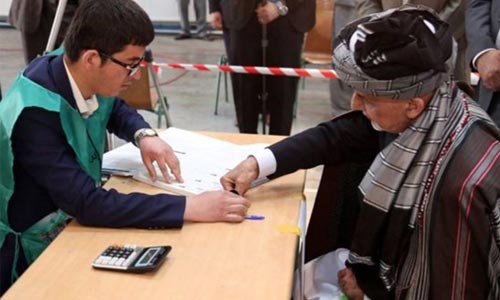Afghans are preparing to celebrate democracy through participating the fourth round of presidential election, for which a number of political heavyweights have been nominated. The candidates seek to form their political teams so as to beat out their opponents in the upcoming election. However, the nascent democracy is highly vulnerable in Afghanistan and likely to sustain strong blow by electoral fraud and obstacles before the election.
The upcoming presidential election will not ensure democracy in the country for four main reasons. For the one, the election is scheduled to be held few months later than its legal period, which is a violation of Constitutional law. Second, the security threat will prevent a large proportion of voters from participation. Thus, they will not be able to use their suffrage, which will be another slap in the face of democracy. Third, the past presidential, provincial and parliamentary elections have proved that electoral fraud seems to be an unavoidable phenomenon in Afghanistan and election will be rigged in one way or another. Fourth, the vacuum for female nominees is felt strongly in the upcoming election. That is, although women are entitled constitutionally to run for presidency, the chance for their victory is highly restricted as a result of traditional mindset holding sway in the country and a large number of individuals, mainly in the tribal belts, are believed to be against their leadership at the country level. In his book titled “The Envoy”, US envoy for peace talks Zalmay Khalilzad writes regarding Masuda Jalal, who sought to compete against the former president Hamid Karzai as head of the interim government in 2002 Loya Jirga, that her acquiescence to cabinet post offer in return for not running for presidency “would have avoided a clash with Islamist factions within the Loya Jirga, who were threatening her on the grounds that her candidacy, because she was a woman, violated Islam.” In the first presidential election, Jalal ran for presidency, however, she could not win the public support or votes. Thus, sexual discrimination still rules the country.
Meanwhile, political cleavage between officials within the government body on the one hand and negative rivalries between parties vis-à-vis electoral campaign on the other hand will leave little room for the public incentives to participate in the election. Since the establishment of the National Unity Government (NUG) following the 2014 presidential election, the rift widened between officials, who exchanged harsh rhetoric against one another. To the unmitigated chagrin of Afghan men and women, the mouth-watering promises made by candidates before the election faded away. Worst of all, the NUG failed to decrease the level of corruption in the government’s machinery or take more practical step in stabilizing the country. For instance, the death toll of Afghan soldiers, which according to President Ghani has reached 45,000 since 2014, is extremely disappointing. It indicates that despite conducting elections, the challenges, including the administrative corruption and instability, will continue unabated that will deal a strong blow to democracy.
Generally speaking, Afghan officials could not win the public trust and the incentive for participating in the election is incredibly low. Now political parties and candidates’ teams are leaving no stone unturned to win the public support for the upcoming election. They have tough task ahead preparing their mouth-watering promises for the masses.
After all, the Taliban are also preparing to have a stake in the government as they are haggling at the table with US envoy Zalmay Khalilzad, who called the recent six-day talks with the Taliban in Qatar “productive”. Rumors suggest that if the Taliban reach a consensus with their interlocutors on ending the Afghanistan’s conflict, presidential election is unlikely to be conducted since the Taliban insist on establishing “Islamic Emirate”, which has nothing to do with election. The Taliban, however, had stated that they would reform their ideology and not impose as strict law as they did during their regime. Thus, Afghans are in limbo and wait impatiently for the result of negotiations. To put it succinctly, a sense of ambivalence about fair and free election as well as fruitful talks fill the air across the country.
The Taliban’s relentless refusal to hold talks with Kabul government has enraged Afghan officials, who are at a crossroads. The public also believe that fighting against Afghan government, however, holding talks with US delegates is nonsense. If the Taliban are genuine in the talks, they have to come to the table with Afghan officials. Thus, the Taliban are still considered a strong obstacle before election and democracy in the country.
All in all, although presidential election and peace talks are debated hotly, the outcome of both are ambiguous and Afghans doubt establishment of a democratic country through the election.
Home » Opinion » Will Upcoming Election Ensure Democracy?
Will Upcoming Election Ensure Democracy?
| Hujjatullah Zia

